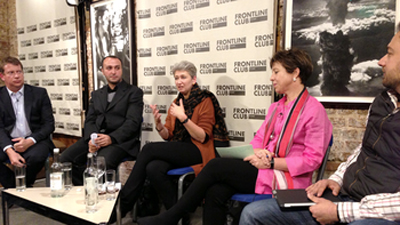The Rohingya People: “A Slow Burning Genocide”
The United Nations has stated that the Burmese military has been driving Rohingya Muslims out of the Rakhine state, killing civilians and burning their land to the ground. Around 400,000 Rohingya people from North Western Myanmar have become refugees in the space of two weeks in a conflict which has long been described as a “slow burning genocide.”
The Frontline Club will screen a short documentary, made by journalist Shafiur Rahman on the current crisis, followed by a panel discussion on the ongoing atrocities that are afflicting the region.
Shafiur Rahman’s documentary on Rohingya women uses harrowing footage from the border with Myanmar as well as devastating testimony from Rohingya refugees. The panel will further help to decipher whether this is an ethno-religious conflict or something more?
Chair
Professor Penny Green
Professor Green is Professor of Law and Globalisation at Queen Mary University of London. Professor Green has published extensively on state crime theory (including her monograph with Tony Ward, State Crime: Governments, Violence and Corruption), state violence, Turkish criminal justice and politics, ‘natural’ disasters, transnational crime, mass forced evictions/displacement and resistance to state violence. She has a long track record of researching in hostile environments and has conducted fieldwork in the UK, Turkey, Kurdistan, Palestine/Israel, Tunisia and Myanmar. Professor Green is Founder and Director of the award winning International State Crime Initiative (ISCI) – a multi-disciplinary international initiative to collate, analyse and disseminate research-based knowledge about criminal state practices and resistance to them. Professor Green’s most recent projects include a comparative study of civil society resistance to state crime in Turkey, Tunisia, Colombia, PNG, Kenya and Myanmar); Myanmar’s genocide against its Muslim ethnic Rohingya; and forced evictions in Palestine/Israel.
Speakers
Shafiur Rahman

Shafiur Rahman is an independent documentary maker. His projects highlight issues around human rights, migration and poverty. Filming in a wide variety of contexts and countries from Bangladesh, Libya, Italy, South Africa, Kenya, the US, his work has taken him most recently to the Myanmar/Bangladesh border. He has been documenting Rohingya refugee stories since 2016
Dr Azeem Ibrahim

Dr Azeem Ibrahim is a Senior Fellow at the Center for Global Policy and Research Professor at the Strategic Studies Institute, US Army War College. He is also author of The Rohingyas: Inside Myanmar’s Hidden Genocide, He received his PhD from the University of Cambridge and has previously been appointed an International Security Fellow at the Kennedy School of Government at Harvard University and a World Fellow at Yale University. Over the years, Dr Ibrahim has met and advised numerous world leaders on policy development. In his most recent roles, he served as National Security and Defence Policy Advisor to the Leader of the (UK) Labour Party, Rt Hon Ed Miliband MP, and the Shadow Cabinet from 2012 to 2015, and as Strategic Policy Advisor to the Chairman of Pakistan’s PTI party, Imran Khan. Read his recent interview in New York magazine here.
Dr Thomas MacManus
Thomas MacManus is a Leverhulme Early Career Fellow based at the International State Crime Initiative in the Department of Law. Thomas is admitted as an Attorney-at-Law (New York) and Solicitor (Ireland). Thomas is an Editor in Chief of State Crime journal, and Joint Editor of Amicus Journal: Assisting Lawyers for Justice on Death Row. He is also a Director of the Colombia Caravana.
Anastasia Taylor-Lind

Anastasia Taylor-Lind is an English/Swedish photojournalist who has been working on issues relating to women, population and war for over a decade. She is a Harvard Nieman Fellow 2016, and recently finished a year of research at the university on war, and how we tell stories about modern conflict. She has written about her experiences as a photojournalist for The New York Times, TIME LightBox, Nieman Reports and National Geographic. As a photographic storyteller, her focus has been on long-form narrative reportage for monthly magazines. Anastasia is currently in Bangladesh covering the Rohingya crisis for Human Rights Watch.



